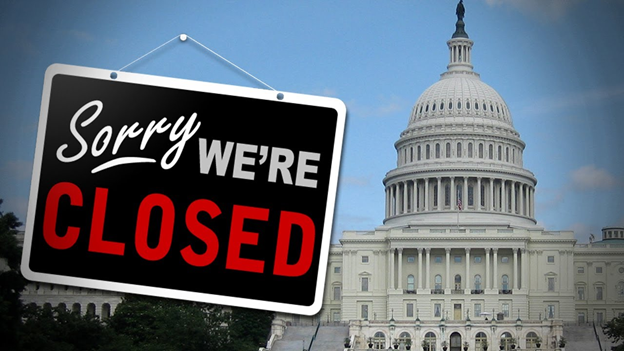Background
The US Congress regulates government spending through appropriations legislation. When and if Congress fails to approve the budget for the upcoming fiscal year, a funding gap is created, resulting in a federal government shutdown.
There have been seventeen federal government shutdowns so far, the first one in 1976. All but one of these shutdowns was less than four days in length. The 1995 shutdown which carried over into 1996, a conflict between President Bill Clinton and House Speaker Newt Gingrich, was the longest shutdown so far with a length of 27 days.
Current Government Shutdown
The current government shutdown started on October 1 and ended on October 17, 2013.
The government shutdown was part of a debate between Democrats and Republicans over the debt ceiling and budget. Republicans are generally against the Affordable Care Act (Obamacare), while Democrats are generally for the bill. Right after the 2012 presidential election, Republicans began planning to strip the Affordable Care Act of its funding. As early as January 2013, Republican Senator John Coryn opined that it might be necessary to shut down the government to ensure the long-term financial health of our country. Congressman Mark Meadows wrote an open letter to Speaker John Boehner and Majority Leader Eric Cantor near the end of August 2013 in which he asked them to defund the Affordable Care Act in any bills sent to the House. Eighty House Republicans backed this letter.
On September 20, 2013, the House passed an appropriations bill that would defund the Affordable Care Act. The bill went to the Senate, where the bill was amended to fund the Affordable Care Act. The bill went back to the House, where it was again changed to strip the Affordable Care Act of funding. The Senate once again removed the defunding clause. At this point, House Speaker John Boehner refused to bring the bill to a vote. As the budget bill was not passed before previous funding ran out, the federal government shut down on October 1, 2013.
 House Speaker John Boehner House Speaker John Boehner |
 House Majority Leader Eric Cantor House Majority Leader Eric Cantor |
Impact
During a shutdown of the federal government, several government services are affected. Services shut down include all American national parks, all American monuments, veteran call centers, veteran hotlines, permits for planned energy/transportation projects, health research, applications for small business loans, and consumer protection. Services that lose funding include food programs for seniors and children, veteran’s compensation, and benefits. Hundreds of thousands of federal workers are furloughed (suspended without pay) until the shutdown ends. Furthermore, hundreds of thousands more have to work without pay until the shutdown ends.
However, Social Security checks still come in the mail, NASA supports astronauts on the Space Station, and wars are still being fought.
For more information, go to http://www.usa.gov/shutdown.shtml.
Debt Ceiling and Implications
The United States currently has a national debt of over $16.9 trillion. The debt ceiling is a legislative measure that caps the amount of national debt that the United States Treasury can issue. If the amount of debt issued exceeds the debt ceiling, then the United States could default on its debt, thereby potentially leading to an economic collapse. According to the United States Department of the Treasury, Congress has raised and/or revised the debt limit 78 times since 1960. The debt ceiling was last raised on May 19th and the United States Treasury predicted that if the debt ceiling was not raised again by October 17th, the U.S. Government would have to default on its public debt.
To see the status of our debt, visit http://www.usdebtclock.org/.
Senate Deal
To avoid the predicted default on U.S. Debt, politicians made a last-minute deal. They passed a bipartisan bill that raised the debt ceiling and continued funding for the Affordable Care Act. However, this bill provides only temporary relief, as it only apportions out funding until January 15. John Chambers, the managing director of Standard and Poor’s rating service, believes that “we’ll be back here in January debating the same issues.” President Obama does not share this opinion. He asserted that the government has to “get out of the habit of governing by crisis.”
The government shutdown brings to light recent debates about our federal budget. Although raising the debt ceiling is effective for pushing away crisis in the short term by allowing us to pay our immediate bills, it only drives up our debt in the long term. Furthermore, it only postpones a potential budget crisis for a few months, when the budget is discussed again. Therefore, politicians in Washington D.C. need to figure out a long-term solution to our debt problem before it catches up to us.
Hari Ravichandran






























